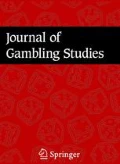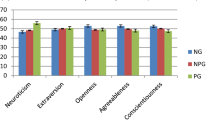Abstract
The aims of this study were to examine the associations between psychiatric disorders and pathological gambling (PG) and the clustering of psychiatric disorders in high risk gambler populations. The sample comprised 140 regular gamblers who were recruited from the general public. A variety of self- report and semi structured questionnaires was administered, including the Mini International Neuropsychiatric Interview, The Personality Diagnostic Questionnaire-4th Edition, NORC DSM-IV Screen for Gambling Problems Self- administered and Problem Gambling Severity Index. Axis I and Axis II psychiatric disorders and personality disturbances were found to be more prevalent amongst pathological gamblers than other gamblers with the strongest differences observed for mood and anxiety-related disorders. Almost two-thirds of pathological gamblers reported both an anxiety or mood disorder in conjunction with another type of disorder. These differences between the gambling groups existed even after controlling for gender. The results highlight the high rates of co-morbidity in pathological gamblers in the community and the extent to which anxiety and mood disorders co-existing with other forms of pathology. These results highlight the significant challenges facing treatment services in the treatment of PG and the extent to which this should be treated as the primary disorder.
Similar content being viewed by others
Notes
This category included anxiety disorders such as Generalised anxiety disorder, Panic disorder with Agoraphobia, Agoraphobia, Panic disorder, Obsessive–compulsive disorder, Social anxiety, Post Traumatic disorder, and also Major depressive disorder.
References
Alegria, A. A., Petry, N. M., Hasin, D. S., Liu, S. M., Grant, B. F., & Blanco, C. (2009). Disordered gambling among racial and ethnic groups in the US; Results from the national epidemiologic survey on alcohol and related conditions. CNS Spectrums, 14, 132–142.
American Psychiatric Association. (1994). Diagnostic and statistical manual of mental disorders (4th ed.). Washington DC: American Psychiatric Association.
Bagby, R. M., Vachon, D. D., Bulmash, E., & Quilty, L. C. (2008). Personality disorders and pathological gambling: A review and re-examination of prevalence rates. Journal of Personality Disorders, 22, 191–207. doi:10.1521/pedi.2008.22.2.191.
Barry, D. T., Stefanovics, E. A., Desai, R. A., & Potenza, M. N. (2011). Gambling problem severity and psychiatric disorders among Hispanic and white adults: Findings from a nationally representative sample. Journal of Psychiatric Research, 45, 404–411. doi:10.1016/j.jpsychires.2010.07.010.
Blaszczynski, A., & McConaghy, N. (1989). Anxiety and/or depression in the pathogenesis of addictive gambling. International Journal of the Addictions, 24, 337–350. doi:10.3109/10826088909047292.
Blaszczynski, A., & McConaghy, N. (1997). Antisocial personality disorder and pathological gambling. Journal of Gambling Studies, 10, 129–146.
Blaszczynski, A., & Nower, L. (2002). A pathways model of problem and pathological gambling. Addiction, 97, 487–499. doi:10.1046/j.1360-0443.2002.00015.x.
Blaszczynski, A., & Steel, Z. (1998). Personality disorders among pathological gamblers. Journal of Gambling Studies, 14, 51–71. doi:10.1023/A:1023098525869.
Blaszczynski, A., Steel, Z., & McConaghy, N. (1997). Impulsivity in pathological gambling: The antisocial impulsivist. Addiction, 92, 75–87. doi:10.1111/j.1360-0443.1997.tb03639.x.
Delfabbro, P. H. (2010). Australasian gambling review (5th ed.). Adelaide: Independent Gambling Authority of South Australia.
Delfabbro, P. H., King, D. L., & Griffiths, M. D. (2012). Behavioural profiling of problem gamblers: A summary and review. International Gambling Studies, 12, 349–366. doi:10.1080/14459795.2012.678274.
Delfabbro, P. H., Osborn, A., Nevile, M., Skelt, L., & McMillen, J. (2007). Identifying problem gamblers in venues. Melbourne: Gambling Research Australia.
Echeburua, E., & Fernandez-Montalvo, J. (2008). Are there more personality disorders in treatment-seeking pathological gamblers than in other kind of patients? A comparative study between the IPDE and the MCMI. International Journal of Clinical and Health Psychology, 8, 53–64.
Evans, L., & Delfabbro, P. H. (2005). Motivators for change and barriers to help-seeking in Australian problem gamblers. Journal of Gambling Studies, 21, 133–155. doi:10.1007/s10899-005-3029-4.
Fager, M. (2007). How does one measure gambling problems? International Journal of Testing, 6, 25–39.
Felsher, J., Derevensky, J., & Gupta, R. (2010). Young adults with gambling problems: The impact of childhood maltreatment. International Journal of Mental Health and Addiction, 8, 545–556. doi:10.1007/s11469-009-9230-4.
Ferris, J., & Wynne, H. (2001). The Canadian problem gambling index: Final report. Submitted for the Canadian Centre on Substance Abuse.
Gerstein, D., Hoffmann, J. L., Murphy, S., Larison, C., Engelman, L., Murphy, S., et al. (1999). Gambling impact and behavior study. Report to the National Gambling Impact Study Commission. Chicago: National Opinion Research Center at the University of Chicago.
Griffiths, M. D. (2005). Video games and health. British Medical Journal, 331, 122–123. doi:10.1136/bmj.331.7509.122.
Hyler, S. E. (1994). Personality diagnostic questionnaire, 4_. New York: New York State Psychiatric Institute.
Ibanez, A., Blanco, C., Donahue, E., Lesieur, H. R., Pérez de Castro, I., Fernández-Piqueras, J., et al. (2001). Psychiatric co-morbidity in pathological gamblers seeking treatment. American Journal Psychiatry, 158, 1733–1735. doi:10.1176/appi.ajp.158.10.1733.
Jacobs, D. F. (1986). A general theory of addictions: A new theoretical model. Journal of Gambling Behavior, 2, 15–31. doi:10.1007/BF01019931.
Kausch, O., Rugle, L., & Rowland, D. Y. (2006). Lifetime histories of trauma among pathological gamblers. American Journal on Addiction, 15, 35–43. doi:10.1080/10550490500419045.
Kerber, C. S., Black, D. W., & Buckwalter, K. (2008). Comorbid psychiatric disorders among older adult recovering pathological gamblers. Issues in Mental Health Nursing, 29, 1018–1028. doi:10.1080/01612840802274933.
Kessler, R. C., Hwang, I., LaBrie, R., Petukhova, M., Sampson, N. A., Winters, K. C., et al. (2008). DSM-IV pathological gambling in the National Co-morbidity Survey Replication. Psychological Medicine, 38, 1351–1360. doi:10.1017/S0033291708002900.
Kim, S. W., Grant, J. E., Eckert, E. D., Faris, P. L., & Hartman, B. K. (2006). Problem gambling and mood disorders: Clinical associations and treatment implications. Journal of Affective Disorders, 92, 109–116. doi:10.1016/j.jad.2005.12.040.
Ladouceur, R., Arsenault, C., Dube, D., Freeston, M. H., & Jacques, C. (1997). Psychological characteristics of volunteers in studies on gambling. Journal of Gambling Studies, 13, 69–84. doi:10.1023/A:1024991300084.
Ledgerwood, D. M., & Petry, N. M. (2006). Posttraumatic stress disorder symptoms in treatment-seeking pathological gamblers. Journal of Traumatic Stress, 19, 411–416. doi:10.1002/jts.20123.
Lorains, F. K., Cowlishaw, S., & Thomas, S. A. (2011). Prevalence of comorbid disorders in problem and pathological gambling: Systematic review and meta-analysis of population survey. Addiction, 106, 490–498. doi:10.1111/j.1360-0443.2010.03300.x.
McConaghy, N. (1980). Behaviour completion mechanisms rather than primary drives maintain behavioural patterns. Activitas Nervosa Superior, 22, 138–151.
McCormick, J., Delfabbro, P., & Denson, L. A. (2012). Psychological vulnerability and problem gambling: An application of Duran Jacobs’ general theory of addictions to electronic gaming machine playing in Australia. Journal of Gambling Studies, 28, 665–690. doi:10.1007/s10899-011-9281-x.
Moran, E. (1970). Varieties of pathological gambling. British Journal of Psychiatry, 116, 593–597. doi:10.1192/bjp.116.535.593.
O’Connor, J., & Dickerson, M. (2003). Impaired control over gambling in gaming machine and off-course gamblers. Addiction, 98, 53–60. doi:10.1046/j.1360-0443.2003.00232.x.
Orford, J. (1985). Excessive appetites: A psychological view of the addictions. Chichester: Wiley.
Pelletier, O., Ladouceur, R., & Rheaume, J. (2008). Personality disorders and pathological gambling. Comorbidity and treatment dropout predictors. International Gambling Studies, 8, 299–313. doi:10.1080/14459790802405913.
Petry, N. M., Stinson, F. S., & Grant, B. F. (2005). Comorbidity of DSM-IV pathological gambling and other psychiatric disorders: Results from the national epidemiologic survey on alcohol and related conditions. Journal of Clinical and Health Psychology, 66, 564–574. doi:10.4088/JCP.v66n0504.
Phillips, D. P., Welty, W. R., & Smith, M. M. (1997). Elevated suicide levels associated with legalized gambling. Suicide and Life-threatening Behavior, 27, 373–378.
Pietrzak, R. H., Morasco, B. J., Blanco, C., Grant, B. F., & Petry, N. M. (2007). Gambling level and psychiatric and medical disorders in older adults: Results from the national epidemiologic survey on alcohol and related conditions. American Journal of Geriatric Psychiatry, 15, 301–310. doi:10.1097/01.JGP.0000239353.40880.cc.
Productivity Commission. (1999). Australia’s gambling industries: Inquiry report No. 10. Canberra: Ausinfo.
Productivity Commission. (2010). Gambling. Canberra: Commonwealth of Australia.
Pulford, J., Bellringer, M., Abbott, M., Clarke, D., Hodgins, D., & Williams, J. (2009). Reasons for seeking help for a gambling problem: The experiences of gamblers who have sought specialist assistance and the perceptions of those who have not. Journal of Studies on Gambling, 25, 19–32. doi:10.1007/s10899-008-9112-x.
Raylu, N., & Oei, T. (2004). The Gambling-related Urges Scale: Development, confirmatory factor validation, and psychometric properties. Psychology of Addictive Behaviors, 18, 100–115. doi:10.1037/0893-164X.18.2.100.
Rodda, S., Brown, S. L., & Philips, J. G. (2004). The relationship between anxiety, smoking and gambling in electronic gaming machine players. Journal of Gambling Studies, 20, 71–81. doi:10.1023/B:JOGS.0000016704.06088.85.
Scannell, E. D., Quirk, M. M., Smith, K., Maddern, R., & Dickerson, M. (2000). Females’ coping styles and control over poker machine gambling. Journal of Gambling Studies, 16, 417–432. doi:10.1023/A:1009484207439.
Scherrer, J. F., Xian, H., Krygiel Kapp, J. M., Waterman, B., Shah, K. R., Volberg, R. A., et al. (2007). Association between exposure to childhood and lifetime traumatic events and lifetime pathological gambling. Journal of Nervous and Mental Disease, 195, 72–78. doi:10.1097/01.nmd.0000252384.20382.e9.
Sheehan, D. V., Lecrubier, Y., Sheehan, K. H., Amorim, P., Janavs, J., Weiller, E., et al. (1998). The Mini-International Neuropsychiatric Interview (M.I.N.I.): The development and validation of a structured diagnostic psychiatric interview for DSM-IV and ICD-10. Journal of Clinical Psychiatry, 59(Suppl 20), 22–33.
Specker, S. M., Carlson, G. A., Edmoson, K. M., Johnson, P. E., & Marcotte, M. (1996). Psychopathology in pathological gamblers seeking treatment. Journal of Gambling Studies, 12, 67–81. doi:10.1007/BF01533190.
Steel, Z., & Blaszczynski, A. (1998). Impulsivity, personality disorders and pathological gambling severity. Addiction, 93, 895–905. doi:10.1046/j.1360-0443.1998.93689511.x.
Taber, J. I., McCormick, R. A., & Ramirez, L. F. (1987). The prevalence and impact of major life stressors among pathological gamblers. International Journal of Addiction, 22, 71–79. doi:10.3109/10826088709027414.
Walker, M. B. (1989). Some problems with the concept of “gambling addiction”: Should theories of addiction be generalized to include excessive gambling? Journal of Gambling Behavior, 5, 179–200. doi:10.1007/BF01024386.
Widiger, T. A., & Coker, L. A. (2001). Assessing personality disorders. In J. N. Butcher (Ed.), Clinical personality assessment: Practical approaches (2nd ed., pp. 407–434). New York: Oxford University Press.
Wood, R. T. A., & Griffiths, M. D. (2007). Online data collection from gamblers: Methodological issues. International Journal of Mental Health and Addiction, 5, 511–518. doi:10.1007/s11469-007-9055-y.
Author information
Authors and Affiliations
Corresponding author
Rights and permissions
About this article
Cite this article
Abdollahnejad, M.R., Delfabbro, P. & Denson, L. The Clustering of Psychiatric Disorders in High-Risk Gambling Populations. J Gambl Stud 30, 933–947 (2014). https://doi.org/10.1007/s10899-013-9392-7
Published:
Issue Date:
DOI: https://doi.org/10.1007/s10899-013-9392-7




